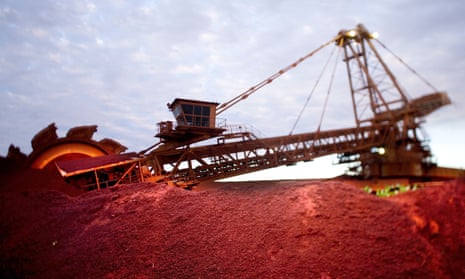It has been a turbulent few years for BHP Billiton, the world’s largest mining and petroleum company.
First came the Samarco tragedy in Brazil, when the collapse of a dam at its iron ore mine unleashed a flood and killed 19 people. The company is still facing the prospect of criminal charges and a potential $47bn settlement over the worst environmental disaster in Brazilian history.
More recently, BHP came under attack from activist hedge fund Elliott Advisors, which has built up a 5% stake as it bids to force executives to rethink the firm’s strategy. Elliott wants BHP’s bosses to bow to its demands, which include the sale of its US shale oil business. The division was snapped up when oil prices were above $100, but is considerably less attractive now that Brent crude is hovering closer to $50.
BHP may be reluctant to seek a buyer at a time when the price is likely to be low, but it is caught between an oil-bearing rock and a hard place.
Incoming chairman Ken MacKenzie, due to start in September, was Elliott’s favoured candidate. He will have been hearing Elliott’s views on the matter, as well as those of BHP’s many powerful investors. That makes Monday’s full-year results presentation among the most important in BHP’s recent history. Is Elliott’s 5% stake a large enough lever to move the biggest mining firm in the world?
Hold your horses, Jacob
Jacob Rees-Mogg, the Conservative politician famed for never having changed a nappy and definitely not wanting to be prime minister, this week tweeted the good news that unemployment had fallen to a 42-year low. This, he suggested, gave the lie to the “Brexit disaster forecast by HM Treasury”. Several pundits and members of the public reminded Rees-Mogg that, as it hasn’t happened yet, the Brexit disaster may be looming rather than immediately upon us.
Expect similar arguments to be rehearsed this week when a revised estimate of the UK’s second-quarter GDP figures is released. This will include data not taken into account when calculating the lacklustre 0.3% GDP rise reported last month. Any downward revision will be seized upon by Brexit naysayers as evidence of icebergs ahead. A stable number or upward revision will strengthen the resolve of those seeking evidence that Britain can prosper on its own.
Either way, growth figures released while Britain is still in Europe will tell us very little about life outside. Of course, that won’t prevent the numbers being deployed in Brexit arguments from Twitter to the Dog and Duck.
Speaking volumes about the jobless
It isn’t very often that the typically dry lexicon of the Office for National Statistics overlaps with the definitions included in the Urban Dictionary, the online repository for unsavoury slang, youthspeak and neologisms.
This coming Thursday is an exception, because the ONS is due to issue the latest figures on Neets, the acronym for people who are Not in Education, Employment or Training. It’s a term that, according to Google, came into common parlance in around 1999 and has surged in popularity since. It has even spawned a Spanish equivalent, “ni-nis”, meaning those who enjoy “ni estudia, ni trabajo”, meaning “neither study nor work”.
The Urban Dictionary, somewhat unfairly, offers synonyms for Neets including “bums” and “layabouts with no future”. The ONS is likely to be more circumspect than that, given that the number of Neets is certainly no laughing matter. Any swelling in their numbers will be seen as a worrying counterpoint to the UK’s low jobless count. That’s because people who are not working or studying tend to become less employable with time, suggesting that while unemployment is currently low, we may be storing up a joblessness crisis for the future unless something is done to nip the problem in the bud.
